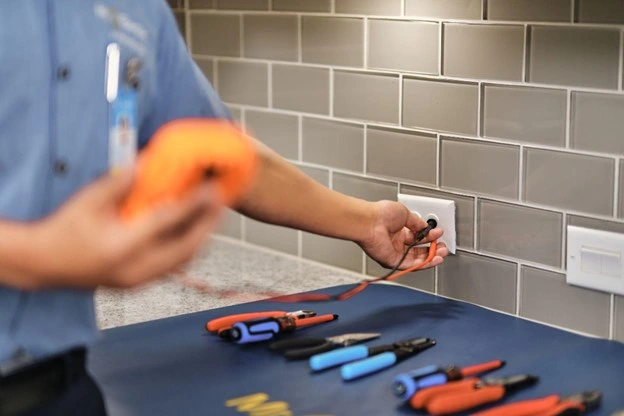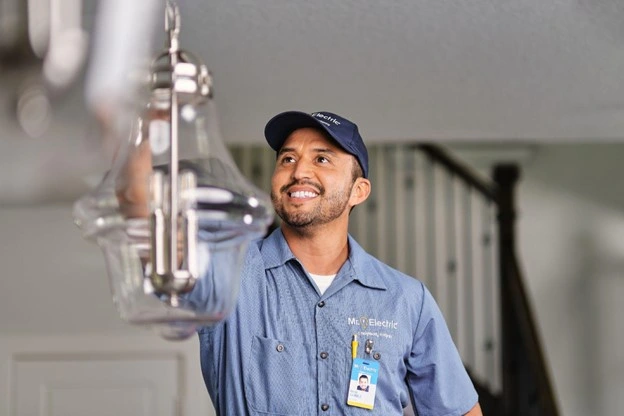
Flickering lights might be just an obnoxious distraction or a serious sign of something gone awry. If you don’t know which is the case, you might miss the chance to mitigate damage to your home.
In order to know whether the flickering lights in your home are being caused by something innocuous or are the sign of a major problem, you need to know about the different causes and what to look for.
In this article, we’ve put together a helpful list of the many possible causes of flickering bulbs and how to resolve them. We’ll also answer some of the most frequently asked questions related to this issue.
Causes of Flickering Lights (and How to Fix Them)
Loose Bulb
Symptoms: An infrequent flicker that only affects one light. It may be exacerbated when plugging in a large appliance or when the air conditioning unit activates.
Solution: To fix this issue, turn off the light and wait for the bulb to cool down. Once it has cooled, fully screw the bulb into the socket. A loosely connected bulb can flicker, so this should solve the issue. If it persists, it was not just a loose bulb issue.
Dimmer Switch Issue
Symptoms: Flickering bulbs that are controlled by a dimmer switch. It will be more noticeable, and more likely to be a dimmer switch issue, if there are bulbs nearby that are fine and not connected to the same switch.
Solution: Turn off the lights and wait for the bulbs to cool down, and then screw them in tightly. Double check both the bulb and switch manufacturers’ websites or manuals to ensure they are compatible. Not all light bulbs are fully compatible with dimmer switches, which can lead to flickers.
Incorrect Bulb Type
Symptoms: Consistent blinking or flickering from bulbs of the same type. It is easier to identify this issue if other nearby bulbs of a different type have no issues.
Solution: Ensure that the bulbs you are using fit the socket and that they are the correct wattage for your fixture. Additionally, if you have fluorescent bulbs, some flickering is normal when they are warming up.
Loose Plug
Symptoms: Flickering from a single fixture, such as a lamp. No other lights are flickering, even if they are on the same outlet or circuit.
Solution: Check the outlet to ensure that the plug is fully inserted. If the plug is already inserted and the issue persists, it may indicate a problem with the bulbs or with the fixture itself.
Voltage Fluctuation

Symptoms: Lights flickering or dimming when a large appliance turns on or is plugged into the wall. Other symptoms include lights dimming or flickering at inconsistent times, light bulbs burning out quickly, and persistent flickering even after a large appliance is turned off. If your appliances and other electronics are faulty, this is another signal that you have a voltage issue.
Solution: Call an electrician. Voltage fluctuations and excessive voltage are serious issues that can lead to electrical fires and major home damage.
Utility Issues
Symptoms: Lights and other electronic items in your home flicker or receive inconsistent power. If it is a utility issue, it will affect everything in the home, not just items on a single circuit.
Solution: Call your utility company. If your home (and likely the homes of your neighbors) is not receiving ample power, then it’s an issue caused by the utilities installed by your provider and not an issue that you can fix on your own.
Overloaded Circuit
Symptoms: As with voltage fluctuation, an overloaded circuit may result in dimming or flickering lights when you turn on large appliances. However, this will likely just affect the room you are in, or the circuit where the large appliance is plugged in. If it happens for a long time, it indicates a serious issue, while a brief dimming or quick flicker may not be a notable problem.
Solution: Call an electrician to confirm whether you have an overloaded circuit. If you do, fix it immediately. Overloaded circuits present a major safety hazard.
Old Wires
Symptoms: Old or loose wires may cause one or more lights to flicker, though it will happen consistently whenever the light is on.
Solution: Call an electrician to inspect your wiring. Old and loose wiring are major causes of home fires and can also impact the efficiency of the electrical components of your home.
Main Connection Issue
Symptoms: If lights flicker in several areas of the home for no identifiable reason, it could be a main connection problem.
Solution: Call an electrician to check on the connection to your main meter box.
Arcing
Symptoms: Arcing will cause infrequent but severe flickering at one or more bulbs. It indicates that the connection is jumping over two disconnected points. It may also be accompanied by a buzzing or cracking noise and the smell of something burning.
Solution: If you notice any of these symptoms, particularly a burning smell or a cracking/sparking noise, call an electrician immediately and then cut the power to that area of your home. Arcs are extremely hot, exceeding 10,000 degrees Fahrenheit, and can easily cause electrical fires.
Flickering Light FAQs
What does it mean if you see lights flickering?
Flickering lights in your home could mean a variety of things. Some of the more common causes of flickering lights include loose bulbs, incompatible bulb types, a poor electrical main connection, a utility issue, old wires, and voltage fluctuations.
Why are all the lights in my house suddenly flickering?
If all the lights in your house are flickering, it could be due to a variety of reasons. The most likely causes are either a poor electrical main connection, old wires, a utility issue, or voltage fluctuations.
Should I be concerned about lights flickering?
Yes, flickering lights should be concerning. When the lights in your home flicker, take note of how many are flickering, where they are located, and the frequency of the flicker. Doing this will help you identify whether the flickering is caused by something dangerous or something innocuous. You can compare the symptoms you observe with our list above to help figure out why your lights are acting up.
Are lights flickering in the house a fire hazard?
In many cases, flickering lights can indicate a fire hazard. If you can determine that it is not a loose bulb, an incompatible bulb type, or a dimmer switch issue, then you should call an electrician to inspect your home wiring immediately.
Can a bad breaker cause lights to flicker?
Yes, a poor connection with the electrical box can cause lights to flicker.
Don’t Want to Try and Fix Flickering Lights on Your Own? Call Mr. Electric

While there are times when flickering lights are not a major concern, you should always take the time to look into what is causing them. Many of the most common causes are harmless, but some pose serious safety risks.
If you’ve noticed that your lights aren’t working as they should, it’s best to call an electrician. At Mr. Electric, we have the experience to identify what is wrong with your lights and correct any issues that could put you at risk.
Need someone to come perform a home electrical safety inspection? Call us to request a service today.
